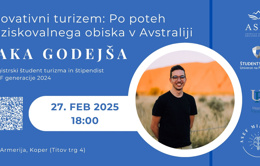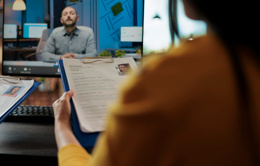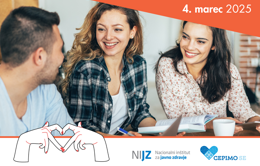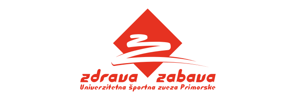Current COVID-19 info for Slovenia
Despite the end to the epidemic, the virus remains among us requiring consideration of all measures to be taken into account.
Regardless of the encouraging decline of the virus, there is still the risk of it spreading. Therefore, social distance and hand and cough hygiene must still be practiced at all times, and any sick individuals must be isolated. Hand sanitation and face masks or scarves are still obligatory in indoor public spaces, as well as on public transport.
It is not allowed to enter the following without wearing a face mask:
- Indoor public spaces, where it is not possible to ensure a safety distance of more than 1.5 m between individuals;
- Public transport vehicles.
Face masks continue to be obligatory for:
- Individuals with respiratory diseases;
- Staff at health institutions based on their level of exposure;
- Staff at all retirement homes and educational institutions for people with special needs;
- Staff at all retirement homes and educational institutions for people with special needs.
Despite the gradual relaxation of protective measures, all larger public gatherings are still prohibited in Slovenia.
Hence, a maximum of 500 people may gather and socialise in public at the same time and same place. In addition, accommodation providers with more than 30 rooms are open and available again, as are spa accommodations, wellness centres, gyms, swimming pools, and water activities.
Until further notice, discos and night clubs remain closed, as do stores on Sundays and holidays, except for petrol stations and pharmacies, which may be open.
The presence of spectators at sport competitions is also prohibited.
Important notice for foreign citizens
Foreign citizens who are unable to travel to their country of origin due to the current situation are advised to contact the nearest diplomatic mission/representation of their country.
Regarding crossing the border, we advise students to contact the e-mail of the Police Information Center (inf.koronavirus@policija.si) or the embassies.
Temporary general restriction of public gathering
The Ministry of the Interior has collected and published the most important explanations regarding the current restrictions on public gathering in Slovenia.
Call centre for information on coronavirus
Changes to call centre schedule
The toll-free telephone number 080 1404 offers information on workdays from Monday to Friday between 8 am and 4 pm.
If you call from abroad, the toll-free call centre can be reached at +386 1 478 7550.
Psychological support during the COVID-19 epidemic
In distress, you can call 041 443 443 every workday between 4 pm and midnight, and on weekends between 12 pm and midnight. Help is provided by experienced psychologists and psychotherapists.
Outside working hours other mental health professionals are available.
Are you worried that you have been infected?
If you become ill (cough, fever, shortness of breath), please:
- Stay at home and avoid contact with other people as it is essential that you self-isolate.
- Call your personal physician or doctor on duty at the nearest emergency clinic if you call outside your doctor's office hours.
- Mind that a patient who suspects that he or she has been infected with the new coronavirus, as a rule, first informs his or her personal physician exclusively by phone. After talking with the patient and consulting a local epidemiologist, the physician will assess whether the suspicion is justified or not. If he decides that the suspicion is justified, the patients will receive very detailed instructions by phone on how to proceed or when, where and how they will be treated next. Patients' first contact thus remains their chosen personal physician or the emergency medical service if their physician is not available.
- Do not go in person to see a doctor for urgent medical help or to the hospital. When in need of emergency medical help, please call there first.
- If the doctor refers a patient for further treatment, it is recommended that they go to the medical institution to which they are referred, by car and not by public transport, i.e. not by train, bus or taxi. In addition, individuals are required to consistently observe the cough hygiene at all times by only coughing into a handkerchief or sleeve. Before leaving home, take care to wash your hands thoroughly with warm water and soap.
- As regards the coronavirus infection, only the symptoms can be treated, since no medicine or vaccine has been available so far. Medications are used to relieve the patient's discomfort, such as to reduce fever, while the more serious progression of the disease requires supportive treatments such as artificial respiration, administering oxygen, and adding fluids to strengthen lung functioning.
The most common signs indicating suspicion of infection
COVID-19 disease, caused by the novel coronavirus SARS-CoV-2, is most commonly manifested by feeling unwell, fatigue, cold symptoms, fever, coughing, and in more severe cases shortness of breath. A typical feature of more severe cases of infection is pneumonia.
Novel coronavirus infections cannot be distinguished from other acute respiratory infections, including pneumonia, based solely on the progress of the disease and the patient’s difficulties. Microbiological testing is required to confirm or exclude new infections.
Although the precise incubation period is not yet known, the estimate based on other coronaviruses and preliminary information is 2 to 12 days, probably not more than 14 days. The average duration of the incubation period is around 6 days.
The novel coronavirus is transmitted between humans via respiratory droplets that people sneeze or cough. This means that close contact with an infected person is required for transmission at a distance to the patient of less than 1.5 m. There is no reliable evidence yet that the novel coronavirus is transmitted through contact with contaminated surfaces.
There is also no evidence that the virus is airborne (transmitted via aerosols).
In order to prevent coronavirus infection, it is therefore necessary to wash your hands several times a day with soap and water, and to observe strict cough hygiene. The same principles of prevention apply as those used for preventing other communicable diseases causing respiratory infections.
Around 80% of infected people overcome this disease without serious health problems, showing only cold or flu symptoms. In more severe forms of the disease, pneumonia or severe bronchitis may develop.
Be mindful of cough hygiene and regular hand washing
- Stay home if you are taken ill.
- Avoid staying in enclosed spaces, provide for regular ventilation.
- Avoid close contact with people who show signs of infectious disease.
- Observe the rules of cough hygiene and regularly wash your handswith soap and warm water.
- If soap and water are not available, use hand disinfectant intended for that purpose. Use hand disinfectant that contains at least 60% alcohol. Hand disinfectant is intended for external use only. Surface cleaners or disinfectants are not intended for cleaning or disinfecting your skin.
- It is important to first rinse your hands under warm running water.
- Scrub both hands with soap, which should be applied to the entire surface of your hands (the palms and the backs of your hands, between the fingers and around the thumbs, under fingernails), for one minute.
- Thoroughly rinse the soap off your hands with warm water.
- Pat your hands dry with a single-use paper towel. Use the paper towel to turn off the tap; do not touch the tap with your freshly washed hands.
- Hand disinfection is mandatory in enclosed public spaces.
- Avoid touching your eyes, nose and mouth.
- When you feel like coughing or sneezing, cover your mouth and nose with a paper tissue. If you do not have one, cough or sneeze into the upper part of your sleeve.
- Dispose of the tissue in a waste bin after every use.
- After coughing or sneezing, wash your hands with soap and water every time.
There is no general need to wear protective masks
In enclosed public spaces, it is important to have your mouth and nose completely covered with a protective mask, scarf, or shawl, especially if you have a respiratory infection or you are caring for someone with such an infection.
- Proper placing of protective mask on your face requires that you wash your hands thoroughly with soap and water or disinfect them before you even start putting on the mask.
- Hold the mask in such a way that the built-in metallic strip is on the top of the mask. If you use a coloured mask, make sure the white side of the mask is on the inside.
- Place the ear-loops around each ear and press the metallic strip against the nose so that the mask fits snugly against the face.
- Hold the mask on the nose and pull its bottom part under the chin.
- A properly positioned protective mask must cover the mouth, nose and chin. If you wear glasses, place the glasses above the mask.
- Protective masks are intended for single-use and should be replaced after two hours or as soon as they become humid.
- However, before removing the mask properly, don't forget to first wash your hands thoroughly with soap and water or disinfect them.
- Be careful to remove the mask by holding it only by the ear loops as otherwise you may become infected.
- Put the mask in a plastic bag and seal it with a knot or elastic band and keep it in a safe place for 72 hours.
- After 72 hours, throw the bag containing the mask into a waste bin.
- Finally, wash or disinfect your hands again.
The National Protection and Rescue Plan in the event of a communicable disease epidemic or pandemic in humans
Irrespective of the occurrence of coronavirus infection, Slovenia has prepared a National Protection and Rescue Plan to deal with the occurrence of a communicable disease posing a high threat to public health. The National plan contains detailed action protocols and is aimed at ensuring the smooth operation of all key stakeholders at the national level.
The National Protection and Rescue Plan in the event of a communicable disease epidemic or pandemic with humans is generally activated when an epidemic or pandemic of a communicable disease in humans is declared in the territory or part of the Republic of Slovenia, and where in addition to health care and other services, forces and means for protection, rescue and assistance must be used.
When the National Protection and Rescue Plan is activated in the event of a communicable disease epidemic or pandemic in humans, regional protection and rescue plans or individual parts of municipal protection and rescue plans in threatened or infected areas where the communicable disease epidemic or pandemic has occurred, are activated as well.
The motion to activate the National Protection and Rescue Plan in the event of a communicable disease epidemic or pandemic in humans is presented by the Minister of Health, and the decision to activate the Plan in the event of a communicable disease epidemic or pandemic in humans is taken by the Civil Protection Commander.
Are you worried you have been infected?
If you have travelled from a coronavirus outbreak area or if you have been in close contact with a person who has travelled from such area and you have fallen ill (coughing, fever, shortness of breath), please follow this advice:
- stay at home and avoid contact with other people,
- call your personal doctor or a doctor on call and explain your situation and
- practise respiratory hygiene/cough etiquette.
More information on COVID-19 disease and the measures taken in Slovenia is available on 080 1404 Monday to Friday between 8am and 4pm. If you are calling from abroad, the call center is available on +386 1 478 7550.
The current situation in the world
Monitoring the epidemic globally and in Slovenia
Real-time recording of cases globally: Our world in data, Coronalive.info
For information on the spread of the coronavirus, please visit the websites of the European Union and the World Health Organisation.
We also post up-to-date information by individual country.
The spread of infection in Slovenia is monitored by Tracker.












